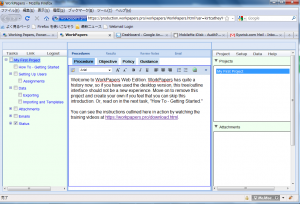You know when something has gone a bit far and it’s time to differentiate when so-called professionals start (calling themselves that) actually making a profession out of something. Huh? Back in 1987 when I was first hooked up to the internet as an individual through The Well community in San Francisco, I would have never imagined that just six years later job advertisements would appear for full-time email system administrators. That came to pass and by about 2000 I was not interested in the administrative side of the business of IT any more and started working on consulting projects. Right around that time, the web was kicking in full force and all enterprises were levitating various services toward web technology. Email and related technology was no longer that interesting, so I started working on an application called J-World, a document management and knowledge management system for KPMG in Japan.
What is so different about J-World and a private cloud? What is so different about any web service out there and a public cloud?
Answer: A lame consultant that doesn’t have the technical skill to sell any other service.
The cloud jargon is now getting filtered from my understanding. In fact, from now on, when somebody says ‘cloud’, I’m going to confirm, ‘You mean web service?’ Or, ‘You mean internet service?’ Or, ‘YOU MEAN THE SAME %$#ing INTERNET AND ALL ITS RELATED SERVICES WE HAVE BEEN USING FOR THE LAST 20 YEARS?’
I was at a user forum for one of my most recent, favorite alliance partners and one of the other speakers introduced himself as a cloud consultant. I laughed, and said, “things are kind of foggy around SLAs these days eh?”, citing an article in Network World which revealed that WEB SERVICE (not cloud) service level agreements are far shakier than other IT services, such as data centers.
Well, can’t write an article these days without mentioning WorkPapers.Pro. Over the past couple days have put up some updates, added a template to the support forum (with many more to come), and now have a nice, manageable following of beta testers. The software is now very robust and data table changes are frozen, and in the final stages of pre-release. The most recent version was released on August 1, 2010, which is my younger daughters eighth birthday, so named the release after her. Now, anybody that knows Hannah’s birthday can figure out when the next and final pre-release deployment will take place. Hint: very soon.
Here is a screen shot….


